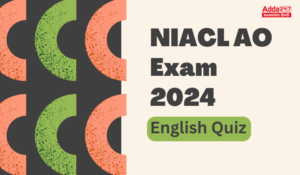SBI Clerk English Questions: 21st June
State Bank of India’s most awaited clerk exam is just a day away. All the practice and revision is essential for the final touches. English being the subject that gives chills to most of the students need attention on a daily basis. Fight the fear of English with SBI Clerk Crash Course Night Class quiz. These quizzes will enable aspirants to have the experience about what type of question can be asked in the actual examination, and you can be fully prepared for the D- day. Here is today’s quiz on the English Language to help you assess your preparation for SBI Clerk Prelims 2019. Keep Practicing. All the best.
Directions (1-5): In each of the questions given below a/an idiom/phrase is given in bold which is then followed by five options which then try to decipher its meaning as used in the sentence. Choose the option which gives the meaning of the phrase most appropriately in context of the given sentence.
Q1. All eighty opposition members of parliament have handed in their resignation.
submitted
shared
accepted
collected
combined
Solution:
The phrasal verb “handed in” means to give something to an authority or responsible person. “submit” is a verb which means to present (a proposal, application, or other document) to a person or body for consideration or judgment. All the other words fail to convey the appropriate meaning of the highlighted phrase. Hence, option (a) is the most suitable answer choice.
Q2. Continuing violence could hold up progress towards reform.
rob
approve
delay
block
conform
Solution:
The phrasal verb “hold up” means to cause a delay for someone or something, or to make them late. “Delay” is a verb which means to make (someone or something) late or slow. All the other words fail to convey the appropriate meaning of the highlighted phrase. Hence, option (c) is the most suitable answer choice.
Q3. I had a few minutes before the meeting to look over what he'd written.
neglect
disregard
grasp
examine
determine
Solution:
The phrasal verb “look over” means to quickly examine something. “Examine” is a verb which means to inspect (someone or something) thoroughly in order to determine their nature or condition. All the other words fail to convey the appropriate meaning of the highlighted phrase. Hence, option (d) is the most suitable answer choice.
Q4. We asked the boss to put off the meeting until tomorrow.
hold
postpone
attend
upgrade
assign
Solution:
The phrasal verb “put off” means to postpone or delay. “Postpone” is a verb which means to cause or arrange for (something) to take place at a time later than that first scheduled. All the other words fail to convey the appropriate meaning of the highlighted phrase. Hence, option (b) is the most suitable answer choice.
Q5. The victim was apparently trying to get away when he shot.
trap
camouflage
arrive
release
escape
Solution:
The phrasal verb “get away” means to leave or escape from a person or place, often when it is difficult to do this. “Escape” is a verb which means to break free from confinement or control. All the other words fail to convey the appropriate meaning of the highlighted phrase. Hence, option (e) is the most suitable answer choice.
Directions (6-15): Which of the following phrases (I), (II), and (III) given below each sentence should replace the phrase printed in bold letters to make the sentence grammatically correct? Choose the best option among the five given alternatives that reflect the correct use of phrase in the context of the grammatically correct sentence. If the sentence is correct as it is, mark (e) i.e., "No correction required" as the answer.
Q6. With overseas crude trending downwards, domestic fuel prices only expects to go down further.
(I) fuel prices are only expected to
(II) fuel prices would only
(III) fuel prices might only
Only (I) is correct
Only (II) is correct
Only (III) is correct
All (I) (II) and (III) are correct
No correction required
Solution:
The given highlighted phrase is grammatically as well as contextually incorrect. All the given alternatives are grammatically viable to replace the highlighted phrase in order to form a coherent sentence. The context of sentence provides a hint that the later phrase should be an event of near future. Hence, option (d) is the most suitable answer choice.
Q7. Had I knew the project grade was not going to be counted, I would have avoided the assignment all together and spared myself the nervous breakdown I almost had at eleven.
(I) If I would knew the project grade
(II) Had I known the project grade
(III) If I had known the project grade
Only (I) is correct
Both (II) and (III)
Only (III) is correct
All (I) (II) and (III) are correct
No correction required
Solution:
The given highlighted phrase is grammatically incorrect. Alternatives (II) and (III) are grammatically viable to replace the incorrect phrase. Conditional sentences are used to talk about things that might have happened, but didn’t. Note that here we use a past perfect tense in the if-clause and would/could have + past participle in the main clause. For alternative (II) it should be noted that in formal English, the subject and the auxiliary can be inverted in the if-clause with if omitted. Hence, option (b) is the most suitable answer choice.
Q8. With so many scammers out there, it's understandable that business leaders are skeptical about offers that sound too good to have been true.
(I) to good having been true
(II) too good to become true
(III) too good to be true
Only (I) is correct
Both (II) and (III)
Only (III) is correct
All (I) (II) and (III) are correct
No correction required
Solution:
The given highlighted phrase is grammatically incorrect. Instead of “to have been” in the highlighted phrase, it should be “to be” as the sentence structure should be too + positive degree + to + V1. Thus, only option (III) is grammatically correct. All the other given alternatives are incorrect. Hence, option (c) becomes the most suitable answer choice.
Q9. No sooner the dust had settled than an internal audit revealed massive irregularities in the company’s procurement department, leading to the arrest of top company heads.
(I) No sooner has the dust
(II) No sooner the dust has
(III) No sooner had the dust
Only (I) is correct
Both (II) and (III)
Only (III) is correct
All (I) (II) and (III) are correct
No correction required
Solution:
The given highlighted phrase is grammatically incorrect. Instead of “No sooner the dust had” it should be “No sooner had the dust” as in sentences that begin with the words such as no sooner, hardly, scarcely, rarely, seldom, the auxiliary verb is placed before the subject. Hence, option (c) is the most suitable answer choice.
Q10. They finally see eye with eye on the business deal to overcome its stagnant growth across the developing nations.
(I) saw eye to eye
(II) saw eye from eye
(III) saw eye with eye
Only (I) is correct
Both (II) and (III)
Only (III) is correct
All (I) (II) and (III) are correct
No correction required
Solution:
The given highlighted phrase is grammatically incorrect. It is to be noted that ‘See eye to eye’ means agreeing with someone while ‘Saw eye from eye’ means to take revenge with someone. Since, only alternative (I) is suitable to replace the incorrect phrase, option (a) becomes the most suitable answer choice.
Q11. Maloney did not respond to requests for comment, and a half dozen did not neither of his referee and colleagues from across the state.
(I) nor did a half dozen
(II) neither did a half dozen
(III) neither did half a dozen
Only (I) is correct
Both (II) and (III)
Only (III) is correct
All (I) (II) and (III) are correct
No correction required
Solution:
The given highlighted phrase is grammatically incorrect. All the given alternatives are grammatically viable to replace the highlighted phrase in order to form a coherent sentence. When Neither is used at the beginning of a clause and is not paired with Nor, but follows a previous negative statement, we must invert word order, meaning that the subject and the verb or auxiliary are inverted. Also when Nor is used at the beginning of a clause and is not paired with Neither, it must follow a negative statement. We must invert word order, meaning that the subject and verb or auxiliary are reversed. Hence, option (d) is the most suitable answer choice.
Q12. The cost of built new hospital was considerably higher than first estimated.
(I) the newly built hospital
(II) building the new hospital
(III) building new hospital
Only (II) is correct
Both (I) and (II)
Only (III) is correct
All (I) (II) and (III) are correct
No correction required
Solution:
The given highlighted phrase is grammatically incorrect. Alternatives (I) and (II) are precise to replace the highlighted phrase forming a grammatically correct and contextually meaningful sentence. Alternative (III) is incorrect as the sentence has mentioned a specific hospital which requires the definite article ‘the’. Hence, option (b) is the most suitable answer choice.
Q13. As energy storage projects was almost neglected in India, efforts have been made to tender and auction solar and wind capacity along with battery energy storage in the country.
(I) are almost negligible in India
(II) was almost negligible at India
(III) had been almost neglected in India
Only (I) is correct
Both (I) and (II)
Only (III) is correct
All (I) (II) and (III) are correct
No correction required
Solution:
The given highlighted phrase is incorrect. Only alternative (I) is precise to replace the incorrect phrase. It should be noted that ‘negligible’ is an adjective which means very small or unimportant as to be not worth considering; insignificant while ‘neglected’ means suffering a lack of proper care. Moreover, projects are plural noun thus it requires a plural verb to comply with subject-verb agreement. Hence, option (a) is the most suitable answer choice.
Q14. Not only they must disobey the rules or conventions of society, but more importantly they must rethink the way they have understood the world to be.
(I) Not only must they disobey
(II) They must not only disobey
(III) They must disobey not only
Only (I) is correct
Both (I) and (II)
Only (III) is correct
All (I) (II) and (III) are correct
No correction required
Solution:
The given highlighted phrase is incorrect. Alternatives (I) and (II) are suitable to replace the incorrect phrase to form a grammatically correct sentence. Subject-auxiliary inversion occurs in declarative clauses only when certain types of element are put in front position. Negatives are one very obvious type of element that triggers subject-auxiliary inversion when fronted. However, in other cases parallelism must be followed while using not only…but also. Hence, option (b) is the most suitable answer choice.
Q15. The government is reported to be studying a couple of options to address agrarian distress.
(I) reports to studying
(II) was reporting to be studying
(III) have been studying
Only (I) is correct
Both (I) and (II)
Only (III) is correct
All (I) (II) and (III) are correct
No correction required
Solution:
The given sentence along with the highlighted phrase is grammatically correct and contextually meaningful. Since it does not require any corrections, option (e) is the most suitable answer choice.





 English Quiz For NIACL AO Mains 2024 Exa...
English Quiz For NIACL AO Mains 2024 Exa...

